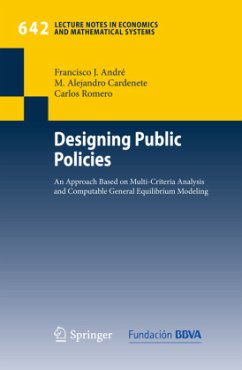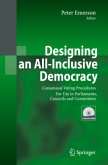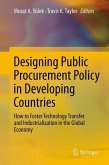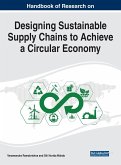Designing Public Policies presents a pragmatic framework for policy design. This new approach combines multi-criteria decision making with computable general equilibrium modeling techniques to create policies consistent with economic theory.
This monograph provides a novel approach to the evaluation of economic policy by combining two different analytical strategies. On the one hand, the computable general equilibrium (CGE) analysis, a standard tool mostly used to quantify the impact of economic measures or changes in the structural data of the economy. On the other hand, the multiple criteria decision-making (MCDM) approach, an op- misation technique that deals with problems with more than one objective. Ty- cally, CGE is well suited for the analysis of the interactions of multiple agents from the point of view of a planner single objective. Combining this technique with the MCDM approach allows developing models in which we ?nd many interacting agents and a decision maker with several objectives. The contribution of this work is partly methodological and partly applied. It provides a framework for the analysis of this type of problems, as well as a series of applications in which the strength of the approach is made clear. The consideration of environmental problems, as a speci?c ?eld in which this technique of analysis can be used, is particularly well chosen. The environmental concern keeps growing steadily and has already become an issue in most of the standard economic decisions. It is therefore extremely important to ?nd systematic ways to introduce such a concern in the models with which we evaluate the impact of policy measures.
This monograph provides a novel approach to the evaluation of economic policy by combining two different analytical strategies. On the one hand, the computable general equilibrium (CGE) analysis, a standard tool mostly used to quantify the impact of economic measures or changes in the structural data of the economy. On the other hand, the multiple criteria decision-making (MCDM) approach, an op- misation technique that deals with problems with more than one objective. Ty- cally, CGE is well suited for the analysis of the interactions of multiple agents from the point of view of a planner single objective. Combining this technique with the MCDM approach allows developing models in which we ?nd many interacting agents and a decision maker with several objectives. The contribution of this work is partly methodological and partly applied. It provides a framework for the analysis of this type of problems, as well as a series of applications in which the strength of the approach is made clear. The consideration of environmental problems, as a speci?c ?eld in which this technique of analysis can be used, is particularly well chosen. The environmental concern keeps growing steadily and has already become an issue in most of the standard economic decisions. It is therefore extremely important to ?nd systematic ways to introduce such a concern in the models with which we evaluate the impact of policy measures.








